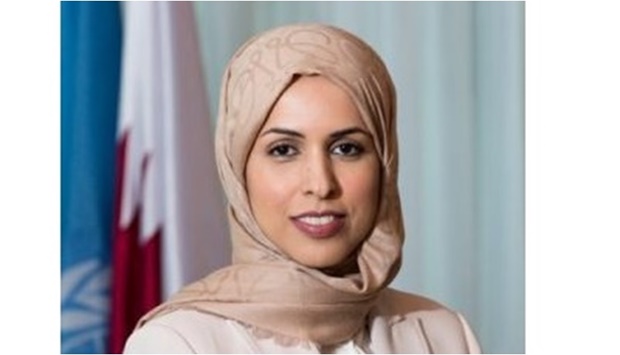HE Permanent Representative of the State of Qatar to the United Nations indicated that the review conference is being convened in a very complicated situation as nuclear weapons still pose a profound threat to mankind and the nonproliferation regime is exposed to numerous challenges, where the consecutive international crises and the global economic imbalances are adversely affecting the expansion and enhancement of the peaceful utilisation of atomic energy, especially in the developing countries that suffer from the decline of the opportunities of sustainable development. She pointed out that the conference can further underscore the keenness of upholding the contractual obligations to the international community and ensure the importance of the treaty as an effective tool for collective security through pursuing practical steps for fair and balanced implementation of its three core pillars, including nonproliferation, disarmament, and peaceful uses of nuclear energy.
HE Sheikha Alya called for initiating the multi-lateral negotiation context to attain a binding document that achieves the goal included in the sixth article of the treaty, emphasising that pending attainment of that goal, there would be an exigent need for finding out an international instrument that is legally binding for all nuclear weapons states to essentially pledge to provide safeguards to non-nuclear-weapon states parties to the treaty to refrain from using nuclear weapons or threaten to use them against the states.
HE Permanent Representative of the State of Qatar emphasised the significance of enhancing NPT's regime to ensure that peaceful uses of nuclear energy are not diverted to other purposes to make sure that IAEA's safeguards system, which is essentially formulated with the additional protocol, constitutes the cornerstone of verification of nuclear non-proliferation regime to achieve the treaty's goals, pointing out that IAEA is the international agency which is solely entrusted to conduct verification that requires all kinds of support from the entire states to further undertake that role.
HE Sheikha Alya Ahmed bin Saif al-Thani underscored that the international verification regime will remain deficient unless it is accompanied by concerted efforts to halt the nuclear arms race, in addition to reducing nuclear stockpiles, and ultimately attain nuclear disarmament, stressing the importance of exerting the assiduous efforts for the sake of achieving the treaty's universality, calling for the necessary accession of non-nuclear states parties to the treaty as nonnuclear states.
She stressed that the entitlement for the peaceful use of atomic energy is an inalienable right of the states which remains an integral part of their rights in development and is considered one of the three pillars of the treaty, expressing her appreciation and gratitude for IAEA for enhancing and expanding the contribution of atomic energy to peace, health, and prosperity in the entire world, calling for fostering IAEA's role in supporting the peaceful uses of atomic energy, particularly the technical co-operation program which is deemed the key tool of IAEA to transfer nuclear technology to the member states for peaceful uses.
HE Sheikha Alya Ahmed bin Saif al-Thani also urged advanced states in the nuclear industry to provide scientific and technical assistance to the developing countries which need greater support, including expanded international co-operation. In the statement of the State of Qatar, HE Permanent Representative of the State of Qatar to the UN also tackled the decision of the 1995 Review Conference concerning the Middle East, where she stressed that it is an integral part of infinite treaty extension deal, and will remain valid pending accomplishment of its goals.
She added that there is the collective responsibility of establishing the region imposed by documents and international resolutions, including UN Security Council's Resolutions No. 487 of 1981 and 687 of 1991, emphasising that the persistent absence of progress toward establishing the region has grave consequences that might potentially threaten regional and international peace and security, indicating that the review conference called for rectifying the track and take further effective steps to achieve progress in establishing the region.
She called on all treaty member states to reach an essential consensus in order for the conference to come out with a final document that advances the joint action towards the full accomplishment of the NPT objectives.

